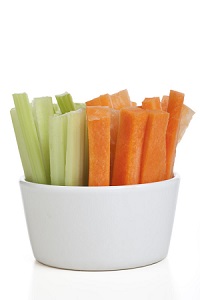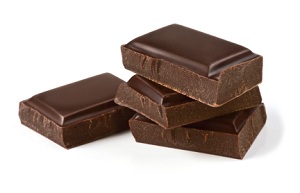
A good rule to follow when looking for healthy snack foods is to make sure you look for snacks that are high in protein and contain complex carbohydrates. Protein is critical because it is a primary component of every cell in the human body. The body uses protein to make and mend tissue as well as to reproduce bone, muscle, hair, nail, skin and blood cells. Carbohydrates are the body’s main source of energy and come in two forms, simple and complex. Complex carbohydrates are your better choice, such as whole grains. However, you can choose simple carbohydrates as long as you choose “good” simple carbohydrates, like the ones found in fresh fruits.
It is important to try to keep your snack foods within the range of approximately 100 to 150 calories and not to have them in an amount that would take you over your daily calories count. If you are allowed 1600 calories per day then it is reasonable to have three meals of about 400 calories each and two to three snacks of approximately 100-150 calories each. This should keep you within a calorie count to lose weight and remain on a healthy diet eating plan.
In addition to selecting snacks containing high protein and low carbohydrates, making sure to snack regularly in between meals is vital. It’s a great idea to get in tune with your internal hunger clock; don’t wait until your stomach starts talking to you. Practicing portion control will make snacking more effective for you. Instead of grabbing an entire bag of nuts from the kitchen cabinet, try measuring out the appropriate serving size ahead of time.
Here is a list of some good snack choices.
- Apple slices
- Whole grain bread sticks
- Unsalted rice cakes
- Baked tortilla chips
- Nuts (1 ounce or less)
- Whole grain cereal
- Fresh fruit
- Unsweetened canned fruit
- Baked apple
- Raisins
- Frozen grapes
- Celery
- Dark chocolate
- Air popped popcorn
- Low-fat/fat free fruit yogurt
Eating healthy snack foods is just one part of a health maintenance strategy that should incorporate eating healthy and being active. Talk with your trainer and plan out your meal plan and workout routine.
For more articles go to http://lifesportfitness.lifestyleezine.com

 Health conscious people avoid it like the plague and some doctors will tell you to refrain from eating this high calorie, albeit, delicious treat. But wait just one second before you ditch the dark chocolate or swear off it forever for fear that it will add inches to your waist. As it turns out, research now shows that dark chocolate may have a myriad of health benefits which outweigh the risk of weight gain. Here is a closer look at the dark side and why dark chocolate is good for you.
Health conscious people avoid it like the plague and some doctors will tell you to refrain from eating this high calorie, albeit, delicious treat. But wait just one second before you ditch the dark chocolate or swear off it forever for fear that it will add inches to your waist. As it turns out, research now shows that dark chocolate may have a myriad of health benefits which outweigh the risk of weight gain. Here is a closer look at the dark side and why dark chocolate is good for you.